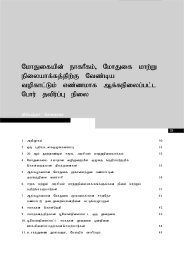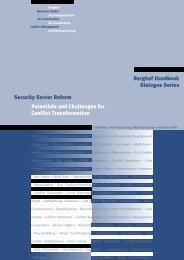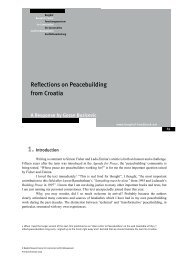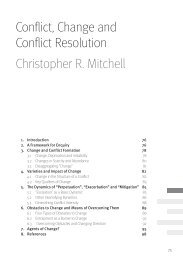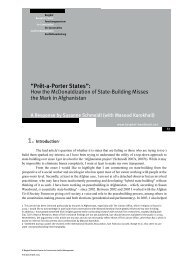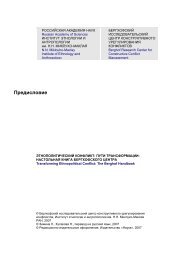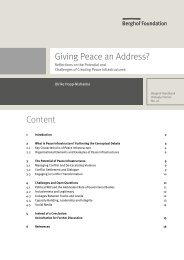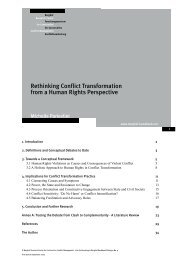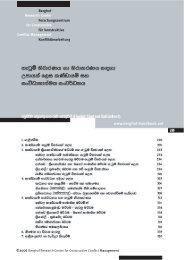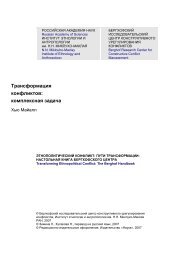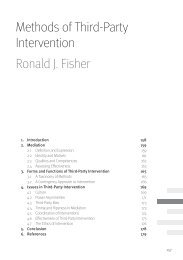Human rights and conflict transformation: The challenges of just peace
Human rights and conflict transformation: The challenges of just peace
Human rights and conflict transformation: The challenges of just peace
You also want an ePaper? Increase the reach of your titles
YUMPU automatically turns print PDFs into web optimized ePapers that Google loves.
group shape most public policies. <strong>The</strong> combination <strong>of</strong> these two principles typically creates an<br />
ethno-class type <strong>of</strong> stratification <strong>and</strong> segregation” (Yiftachel 1997, 507).<br />
2. Horizontal Peacebuilding <strong>and</strong> Conflict Intensification:<br />
Engaging National <strong>and</strong> International Civil Society<br />
As stressed by Parlevliet, it is critical to engage constructively with state structures,<br />
systems <strong>and</strong> society in order to build a positive relationship, both vertically <strong>and</strong> horizontally (in<br />
this volume, 23), <strong>and</strong> to highlight the responsibility <strong>and</strong> accountability <strong>of</strong> the state, general public<br />
<strong>and</strong> civil society. However, in my opinion the lead article over-emphasises the role <strong>of</strong> the state <strong>and</strong><br />
underplays the role <strong>of</strong> civil society, nationally <strong>and</strong> internationally, as a potential force for change.<br />
<strong>The</strong> state <strong>of</strong> Israel relies on the legitimacy <strong>and</strong> the support <strong>of</strong> the Jewish public, both at home<br />
<strong>and</strong> internationally, to sustain its discourse. <strong>The</strong>refore, any positive change in their attitudes <strong>and</strong><br />
perception <strong>of</strong> “the other”, i.e. the Palestinians, might potentially impact on the policy makers <strong>and</strong><br />
shapers. <strong>The</strong> challenge is to communicate with <strong>and</strong> influence Israeli public opinion, to present a<br />
different discourse to the state’s dominant discourse <strong>and</strong> to raise their awareness <strong>of</strong> the violation<br />
<strong>of</strong> human <strong>rights</strong> experienced by their fellow Palestinian citizens <strong>and</strong> the Palestinians in the West<br />
Bank <strong>and</strong> Gaza Strip. Israel’s power depends on the obedience <strong>and</strong> cooperation <strong>of</strong> both Palestinians<br />
<strong>and</strong> Israelis, on various issues. <strong>The</strong>refore, a social change movement that can mobilise for a shared<br />
<strong>peace</strong>ful vision <strong>of</strong> society in Israel <strong>and</strong> Palestine can lead the process <strong>of</strong> <strong>transformation</strong>.<br />
Based on my experience <strong>of</strong> working with Palestinian <strong>and</strong> Israeli human <strong>rights</strong><br />
organisations, my observation is that most <strong>of</strong> the financial <strong>and</strong> human resources have been utilised to<br />
address symptoms or consequences <strong>of</strong> the structural <strong>and</strong> direct violence <strong>of</strong> the <strong>conflict</strong>. <strong>Human</strong> <strong>rights</strong><br />
organisations operating in the Palestinian areas <strong>and</strong> inside Israel provide a very comprehensive <strong>and</strong><br />
detailed analysis <strong>and</strong> documentation <strong>of</strong> the violation <strong>of</strong> human <strong>rights</strong>, <strong>of</strong>ten focusing on litigation.<br />
This, in most situations, addresses the symptoms that have resulted from the systems <strong>and</strong> structures<br />
<strong>of</strong> oppression put in place by the occupying power. One human <strong>rights</strong> activist explained that “we<br />
have the most comprehensive reports, but all <strong>of</strong> them are sitting on the shelves” (RTC 2007).<br />
Recently, some human <strong>rights</strong> organisations have begun to direct more attention to international<br />
advocacy <strong>and</strong> lobbying by establishing <strong>of</strong>fices in the USA <strong>and</strong> Europe. 6<br />
Palestinian <strong>and</strong> Israeli civil society organisations <strong>and</strong> Palestinian policy makers need<br />
to be creative <strong>and</strong> find alternative ways to address the Israeli society at the different levels, <strong>and</strong><br />
include them in a <strong>peace</strong>building process. In order to do that, it is fundamental to underst<strong>and</strong> their<br />
attitudes, fears <strong>and</strong> concerns <strong>and</strong> their context to enable them to develop strategies to address such<br />
issues (Lederach 1999). Israeli society is part <strong>of</strong> the problem <strong>and</strong> therefore needs to be part <strong>of</strong> the<br />
solution. For example, in 2004 the International Court <strong>of</strong> Justice asserted that the construction <strong>of</strong><br />
the “separation wall” is in violation <strong>of</strong> international law, while the majority <strong>of</strong> the Israeli public<br />
supported the construction <strong>of</strong> the wall. This illustrates the necessity to address concerns <strong>of</strong> the Israeli<br />
society, in order to transform their attitudes <strong>and</strong> perception towards the Palestinians. It is important<br />
to move beyond the legal <strong>and</strong> litigation approach towards an open <strong>and</strong> critical dialogue, without<br />
appeasing <strong>and</strong> maintaining the power status quo, but based on mutual recognition <strong>and</strong> respect. This<br />
will be a slow, holistic <strong>and</strong> multi-faceted process <strong>of</strong> engaging with the “enemy”, i.e. the holders<br />
<strong>of</strong> power. <strong>The</strong> aim is to work towards a shared vision <strong>of</strong> a <strong>peace</strong>ful society, based on <strong>just</strong>ice <strong>and</strong><br />
sustainable <strong>peace</strong> that both parties want to promote. Although there is no assumption that attitudes<br />
6 See, for example, B‘Tselem: www.btselem.org/english/About_BTselem/Index.asp (accessed 28 April 2010).<br />
Marwan Darweish<br />
91






